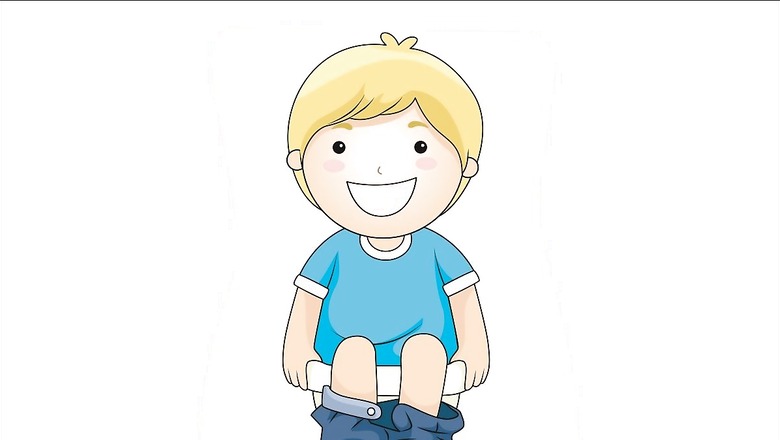
views
Potty training is one of the most important milestones in a child’s development. It involves teaching a child how to use the toilet for urination and defecation, and gradually reducing or eliminating the use of diapers or nappies. Potty training can have a significant impact on a child’s physical, emotional, and social development, as well as their self-esteem and confidence.
However, potty training is not a one-size-fits-all process. Different cultures and families have different approaches and expectations for when and how to potty train their children. Some parents start potty training as early as a few months after birth, while others wait until their children are two or three years old. Some parents use cues and signals from their children to guide the process, while others follow a structured routine and schedule.
But potty training can also be a source of stress and frustration for parents and caregivers. When should you start potty training your child? How can you make the process easier and more enjoyable for both of you? And most importantly, how can potty training affect your child’s toilet hygiene habits in the long run?
Toilet Hygiene Habits in Children
Toilet hygiene habits are the behaviours and practices that your child adopts to maintain cleanliness and prevent infections when using the toilet or potty. Toilet hygiene habits include:
- Washing hands with soap and water before and after using the toilet
- Washing, or wiping properly from front to back after urinating or defecating.
- Flushing the toilet after each use
- Keeping the toilet seat, bowl, and handle clean and dry
- Using toilet paper, tissues, or wipes to clean oneself
- Disposing of used toilet paper, tissues, or wipes in a bin or a flushable toilet
- Avoiding touching the toilet area with bare hands or other objects
- Closing the toilet lid before flushing to prevent the spread of germs
Toilet hygiene habits are important for your child’s health and well-being. Poor toilet hygiene habits can expose your child to harmful bacteria, viruses, parasites, and fungi that can cause various illnesses and infections, such as diarrhoea, urinary tract infections (UTIs), yeast infections, pinworms, scabies, and more. These illnesses can affect your child’s growth, development, nutrition, immunity, and quality of life.
Therefore, it is essential for parents and caregivers to teach and model good toilet hygiene habits for their children from an early age. This involves explaining the reasons and benefits of washing hands, wiping properly, flushing or emptying the potty, and keeping the toilet area clean in simple and age-appropriate terms. It also involves demonstrating these behaviours yourself and providing positive feedback and reinforcement when your child follows them. Additionally, it involves creating a conducive environment for your child to practise good toilet hygiene habits by providing easy access to soap, water, towels, wipes, tissue paper, trash cans, etc.
How Early Potty Training Influences Toilet Hygiene Habits
There are many benefits of early potty training for both children and parents. Some of these benefits include:
- Reducing or eliminating diaper rash, urinary tract infections, constipation, and other health problems related to diaper use
- Saving money and resources by reducing or eliminating the need for diapers or nappies
- Protecting the environment by reducing or eliminating landfill waste from disposable diapers
- Enhancing the bond between parents and children by fostering communication and responsiveness
- Boosting children’s self-esteem and independence by giving them more control over their bodies
A child that is already used to the potty, and knows how to clean themselves, flush the toilet, dispose of tissues and wipes, and wash their hands without reminders is a child who is independent in some ways. He or she can accompany their parents on more outings, and have more opportunities for family fun!
Practical Tips for Effective Early Potty Training
If parents and caregivers decide to start early potty training with their children, here is some practical advice that most experts seem to agree on:
- Start early potty training when both parents and children are ready and willing to do so. There is no fixed age or time for starting early potty training, so don’t force it.
- Choose a method that suits both parents’ and children’s preferences, needs, resources, and goals. There are different methods of early potty training, such as elimination communication, gradual reduction of diapers or nappies, or timed intervals – each has its own merits.
- Use appropriate tools and equipment for early potty training. Parents should provide their children with suitable tools and equipment for early potty training, such as a pot, a sink, a bucket, a bowl, a potty seat, a potty chair, or a regular toilet with an adapter. They should also have access to wipes, tissues, towels, clothespins, plastic bags, or other items that may be useful during the process.
Communicating Toilet Hygiene Effectively
Fortunately, there are many resources available for parents in this regard. The internet abounds with creative ways to help your child remember and repeat the right behaviours – depending on your child’s temperament, you can use everything from songs to cartoons to games to make going to the toilet fun, and safe.
Harpic, India’s leading lavatory care brand, knows how important it is to get these habits right, in early childhood. The Swachh Bharat Mission also found that children are valuable ambassadors for change, and that once we inculcate healthy toilet habits in children, they become second nature to them. Moreover, children are valuable agents of change who, in many cases, were the reasons why their parents built toilets in their homes!
Harpic and News18 have partnered for 3 years now in Mission Swachhta aur Paani, a movement that champions the cause of equal and safe toilet access for everyone. Under the aegis of Mission Swachhta aur Paani, Harpic has worked on several outreach programs aimed at young children and children of school going age. Sesame Workshop India has engaged with 17.5 million children across India, and there are now thousands of ‘Swachhta Champions’ in schools all across the nation.
In addition to outreach programs, Mission Swachhta aur Paani is also fueling change by empowering parents. It is a valuable repository of information on nearly every topic on toilets and sanitation. If there is a toilet and hygiene related topic you want to talk to your children about, you’ll find the resources you’ll need here.
















Comments
0 comment